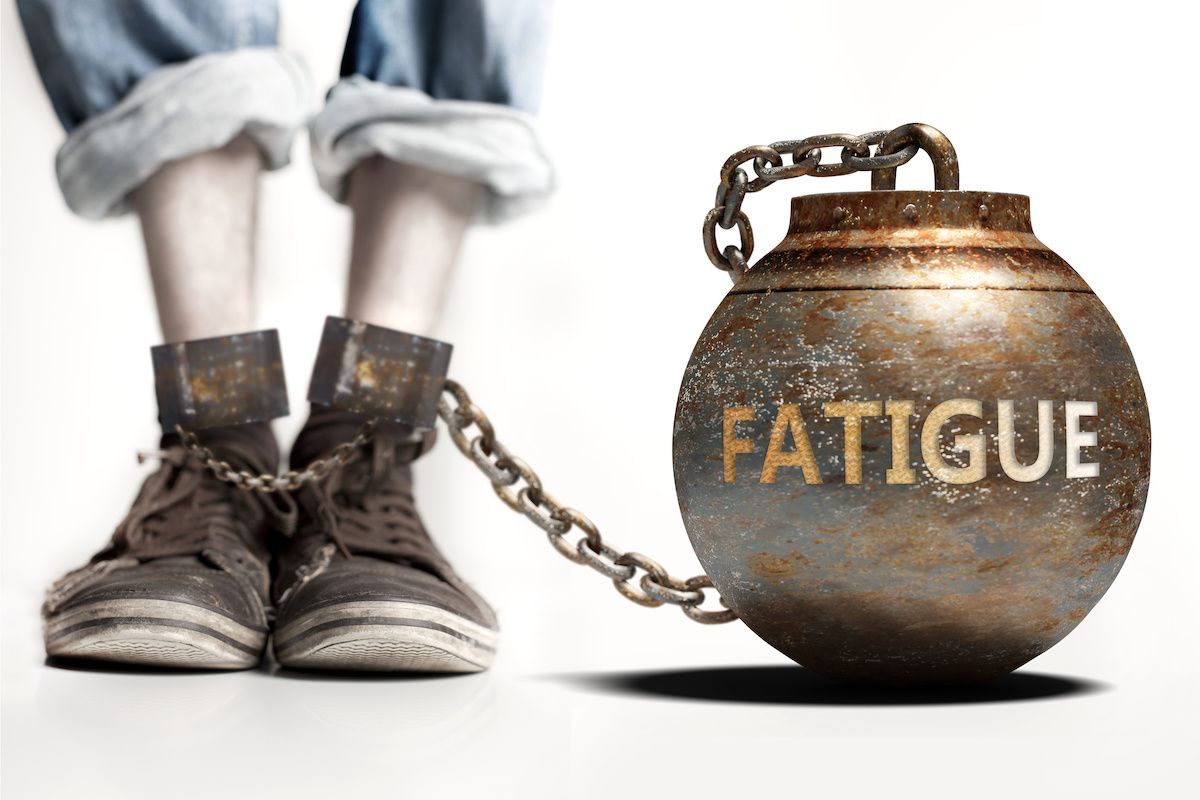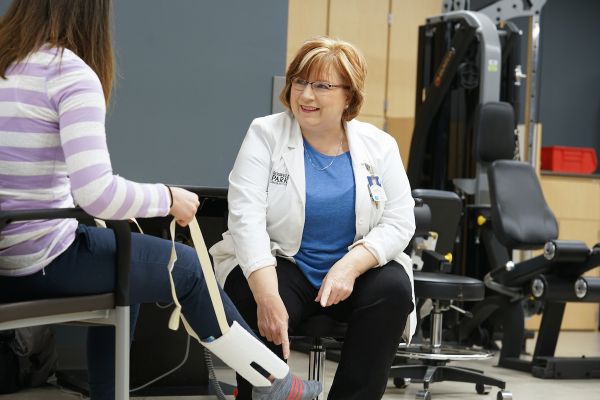If you look for information about fatigue, you’ll run across articles explaining the difference between “tired” and “fatigued.”
Tired describes how you feel, and that feeling goes away with sleep/rest. Fatigue is a persistent lack of energy that usually continues regardless of how much sleep or rest you get. To understand this better, let’s look at three different situations:
- Person A is healthy, but a bit sleep-deprived after a weekend of celebration. After some sleep, the fatigue is gone, and the person feels refreshed.
- Person B has the flu. Despite sleeping most of the day, fatigue remains. Eventually the person shakes off the flu bug, and soon after, the fatigue is gone as well.
- Person C has cancer and is at the end of treatment. Like Persons A and B, Person C is fatigued — and sleeping a lot. Most of the time, this person wakes up just as tired as before they slept. A few weeks or months later, tests show no signs of cancer, but the fatigue remains.
We expect the experiences of Persons A and C to be different, but there are also great differences between Persons B and C — despite both being ill. Why?
How Is Cancer-Related Fatigue Different?
Cancer-related fatigue is a deeper, longer-lasting type of fatigue that is not usually relieved by sleep and rest. It can interfere with your ability to carry out your normal daily activities and affect your quality of life. It may become chronic (long-lasting).
It’s estimated that four out of five cancer patients experience cancer-related fatigue. Medicine can’t predict who will get fatigue — or how severe it will be — based on cancer type, stage, or type of treatment.
What Causes Cancer-Related Fatigue?
Causes can vary from person to person, but the exact cause remains a puzzle. Two people — even if they’re the same age and sex, and are undergoing the same treatment for the same type of cancer — may have very different experiences with fatigue. Here are some contributing factors:
- Cancer and cancer treatments can cause anemia, which occurs when your red blood cell count drops below normal. Red blood cells carry oxygen to our cells, which need it to function. Anemia can range from mild to severe. If the drop in oxygen supply to your cells is significant, you may feel tired, weak, short of breath and/or dizzy, and have headaches and an irregular heartbeat. Anemia can result from:
- Blood loss
- Decreased production of normal red blood cells
- Increased destruction of red blood cells
Cancer and cancer treatments can cause anemia in one or all of these ways. Specific types of drugs may encourage your body to make more red blood cells, but if your red blood cell count drops too low, transfusions may be needed.
- Cancer cells are abnormal and invasive. When a cell becomes cancerous, it does not behave in the same way as a normal cell. Many of its normal functions are hijacked by the cancer. For example, cancer cells may release cytokines — proteins involved in inflammation and the immune response — as well as hormones or other substances that affect your body’s normal metabolism. A slow or altered metabolism or a hormone imbalance can leave you feeling fatigued.
- Cancer cells grow and divide (reproduce) uncontrollably. They require a lot of nutrients for energy, so they steal the nutrients that your normal cells need. As a result, your body’s needs rise. As the cancer’s nutrient and energy demands increase — and become harder to meet — your organs, muscles and tissues may be damaged. It’s important to remember that your body needs extra nutrients and energy to fight the cancer and to heal. This cycle of increasing demands and fewer resources also causes fatigue.
Never miss another Cancer Talk blog!
Sign up to receive our monthly Cancer Talk e-newsletter.
Sign up!What Can I Do to Fight Fatigue?
For most people with cancer, there is no simple answer or magic cure for their fatigue. But acknowledging that it’s real, making some adjustments and sharing the struggle may be helpful. Here are some tips:
- Tell your healthcare provider. They can’t help you if they don’t know what’s going on. If fatigue is interfering with your daily life, write down the specifics (date, time, circumstances, your energy level and how it is affecting you emotionally). Is it making you cranky? Sad? Teary? Anxious? Take the list to your next appointment. This is more helpful than just telling them you’re always tired. Ask about diet, activities, medications and other treatments that may increase your energy and/or reduce your fatigue.
- Talk with a survivor. Fatigue can be hard to handle emotionally. If it seems to be a constant reminder that you have cancer, or that it’s getting worse; if you feel you’ve lost control of your life or have become lonely or isolated; or if others just don’t understand or appreciate how fatigue disrupts your life, it may help to hear from someone else who has had the same experience. The Cancer Coach program at Roswell matches patients with trained coaches who are at least two years out of treatment. (Coaches provide emotional and practical support, not medical advice.) For more information, visit the Resource Center, inside the Sunflower Café, on the first floor of the hospital, or call 716-845-1769 for more information.
- You can also join the Roswell Park Online Community. All you need is an email address.
- Recognize that fatigue can bring new concerns. You may feel as if you’re losing control of your life, or perhaps you feel isolated. Work and financial worries may enter the picture, or existing worries may grow.
- Follow a healthy diet. Eat well-balanced meals and drink two to three quarts/liters of water (or other sugar-free or low-sugar fluids) every day. Instead of two to three large meals per day, try eating small meals or snacks frequently. Complex carbohydrates (high-fiber vegetables and fruits, beans, nuts, whole grains) provide longer-lasting energy. Avoid sugary and processed foods. Read food labels: proteins provide the building blocks your body needs for repairs and healing.
- Conserve your energy. Use both hands when possible. When eating or cooking, use pieces of rubber shelf liner to prevent plates from sliding. Wedge mixing bowls into a drawer so you can stir with both hands.
- Plan. Schedule enough time to complete tasks. You use more energy when you’re rushing.
- Follow good sleep practices. Keep a regular sleep schedule, even on the weekends. Avoid caffeine, chocolate, nicotine and alcohol in the evening.
- Keep moving. Light exercise may actually help relieve fatigue. The hardest part may be getting up and starting. Before you begin, talk to your doctor about your plans.
The Resource Center for Patients and Families (inside the Sunflower Café, on the first floor of the hospital) and the Health Library (online, in the patient portal) offer additional patient education materials about cancer-related fatigue and how to manage it.
Three ways fatigue can affect your daily tasks and routines:
- Low desire – You just don’t want to do it.
- Low energy – You want to do it, but you have no “get up and go.”
- Low ability – You want to do it and you have the energy, but you don’t have the strength.

